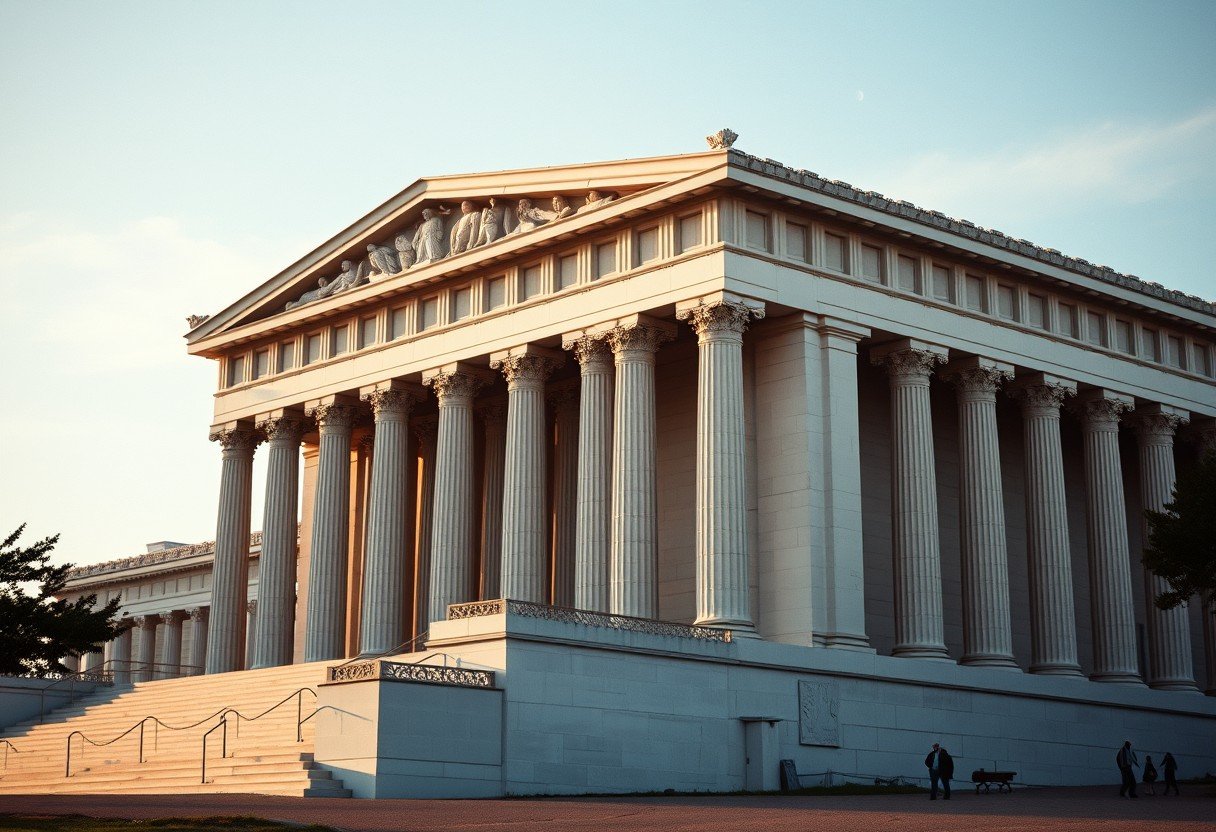While the United States and Ancient Athens are both celebrated for their democratic ideals, their governments operated in vastly different ways. Understanding how a modern representative democracy evolved from the direct democracy of an ancient city-state is key. This exploration reveals fundamental contrasts in citizen participation, government structure, and legal principles, showing how the concept of “rule by the people” has been adapted over thousands of years to fit vastly different societies.
Direct Democracy versus Representative Rule
The most significant difference lies in how citizens exercise their power. Ancient Athens was a direct democracy, a system where eligible citizens gathered to debate and vote on laws themselves. This meant that every major decision, from going to war to building a public work, was put to a popular vote in the assembly.
In contrast, the United States is a representative democracy. Instead of voting on every law, citizens elect officials to represent them and make decisions on their behalf. This system was designed by the Founding Fathers to govern a large and diverse nation, something that would have been impossible with the direct model used in the small city-state of Athens. Managing the complexities of a modern economy and a population of over 330 million requires a specialized group of lawmakers.
This table clearly illustrates the fundamental operational differences between the two systems:
| Feature | Ancient Athens | United States |
|---|---|---|
| Type of Democracy | Direct | Representative |
| Decision Making | By all eligible citizens in an assembly | By elected officials (e.g., Congress) |
| Scale | Small city-state | Large, diverse nation |
| Ideal For | Small, homogenous populations | Large, complex societies |
The American system, therefore, prioritizes efficiency and manageability for a large-scale government, while the Athenian system emphasized direct civic engagement from a much smaller pool of citizens.
Who Gets to be a Citizen?
The concept of citizenship and who was allowed to participate in government was radically different. In Ancient Athens, political rights were highly exclusive and limited to a very small fraction of the population.
Athenian democracy was not for everyone. To be considered a citizen with the right to vote and hold office, you had to be a free, adult male who owned land and was born to Athenian parents. This excluded the vast majority of the population.
- Women
- Slaves
- Foreign residents (known as metics)
This meant that while Athens was a democracy for its citizens, it was not an inclusive society by modern standards. Historians estimate that only about 10-20% of the total population of Athens actually had the right to participate in political life.
Conversely, the United States has a much broader and more inclusive definition of citizenship. The 14th Amendment to the Constitution grants citizenship to anyone born or naturalized in the country. While the struggle for universal suffrage took centuries, today, the right to vote is extended to citizens over 18, regardless of gender, race, or property ownership. This reflects a modern democratic principle that political power should be shared among all people governed.
The Structure of Power: Three Branches versus the Assembly
The organization of government in the U.S. is designed to prevent the concentration of power, a concept that was less formalized in Athens. The U.S. government is built on the principle of separation of powers, dividing responsibilities among three distinct branches.
This structure creates a system of checks and balances, where each branch can limit the power of the others. This was a deliberate design to protect citizens from tyranny. For example, the President can veto laws passed by Congress, but Congress can override the veto with enough votes.
In Ancient Athens, the structure was more unified and fluid. The Assembly (Ekklesia) was the central institution where all major decisions were made. There was also a Council of 500 (Boule) that set the agenda for the assembly and a court system (Dikasteria) with large citizen juries. However, these bodies did not operate with the strict separation of powers you see in the U.S. today. Power was concentrated in the hands of the citizens who showed up to the assembly on any given day.
Laws and Legal Systems: Constitution versus Custom
The legal foundations of the two societies also show a stark contrast. The American legal system is anchored by a single, codified document: the U.S. Constitution.
The Constitution is the supreme law of the land. It establishes the framework for the federal government and guarantees fundamental rights to citizens. All laws passed by Congress and the states must comply with it. This creates a stable and predictable legal environment governed by the “rule of law,” which means that no one, not even the government, is above the law.
Ancient Athens did not have a single constitutional document like the U.S. Constitution. Their legal system was a mix of written statutes, unwritten customs, and precedents established by court decisions. While they had laws, they could be changed more easily by the assembly, sometimes leading to decisions based on popular emotion rather than consistent legal principles. The absence of a supreme law meant that the rights of individuals could be more vulnerable to the whims of the majority.
How Citizens Participate in Government
While citizens in both societies participated in government, the methods were fundamentally different. For Athenians, participation was a direct and often daily responsibility. Eligible citizens were expected to attend the assembly, speak on issues, and vote directly.
In the contemporary United States, citizen participation is primarily indirect, centered on the act of voting in elections. Citizens participate by choosing representatives at the local, state, and federal levels to make decisions for them. Modern voting mechanisms like mail-in ballots and early voting are designed to make this process accessible to millions of people across a vast geographic area.
Beyond voting, U.S. citizens can also engage through advocacy, contacting their elected officials, participating in town halls, and joining political parties. While these are important forms of engagement, they are different from the direct lawmaking power held by an individual citizen in the Athenian assembly.
The Role of Philosophy in Shaping Government
The philosophical ideas underpinning each system were products of their time. The U.S. government was profoundly shaped by Enlightenment thinkers of the 17th and 18th centuries.
Philosophers like John Locke, with his ideas on natural rights (life, liberty, and property), and Montesquieu, who advocated for the separation of powers, provided the intellectual foundation for the U.S. Constitution. These thinkers emphasized reason, individual liberty, and limiting the power of government.
Athenian democracy, on the other hand, was influenced by Greek philosophers like Plato and Aristotle. They explored concepts of justice, virtue, and the ideal state. Their work focused on the citizen’s duty to the community (the polis) and the importance of civic virtue for a healthy democracy. This philosophical background emphasized communal responsibility over the individual rights that are central to American political thought.
Frequently Asked Questions about US and Athenian Governments
What is the main difference between US and Athenian democracy?
The primary difference is that the U.S. has a representative democracy, where citizens elect officials to make laws. Ancient Athens had a direct democracy, where eligible citizens voted on all laws themselves in an assembly.
Were there political parties in ancient Athens?
No, Ancient Athens did not have formal political parties like those in the U.S. While there were political groups and influential leaders who could sway opinion, alliances were often temporary and based on specific issues rather than a fixed party platform.
How did the legal systems differ?
The U.S. legal system is based on the Constitution, a supreme law that all other laws must follow. Ancient Athens lacked a single constitutional document, relying instead on a mix of written laws and unwritten customs that could be more easily changed by popular vote.
Who could vote in ancient Athens compared to the US?
In Ancient Athens, voting was restricted to a small group of free, land-owning adult males born to Athenian parents. In the modern U.S., the right to vote is extended to nearly all citizens aged 18 and older, regardless of gender, race, or wealth.
Why is the US a representative democracy instead of a direct one?
The U.S. founders chose a representative system primarily due to the country’s large size and population. It was considered impractical and inefficient for millions of citizens spread across a vast area to vote directly on every single issue.









Leave a Comment